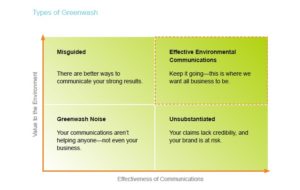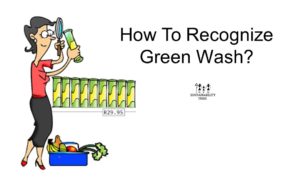Tribe, you might have seen me using the term ‘Green Wash’ every now and then, especially about how to be aware of it in order to choose more sustainable options. Never before have I dedicated an entire article to GreenWashing; but now I feel like I need to discuss the malpractice of ‘greenwashing’ in a bit more detail.
As the concept of environmental sustainability (or in popular culture, ‘Eco-friendly’, ‘green’ or ‘nature-friendly’) started gaining popularity, many organizations joined this popular tide of ‘Eco-friendly’-ness without really taking any efforts, and by merely falsely self-proclaiming that their products or services are greener than their competitors.
Let’s look at a more formal definition of ‘Greenwashing’ or ‘green sheen’
Disinformation disseminated by an organization, etc., so as to present an environmentally responsible public image; a public image of environmental responsibility promulgated by or for an organization, etc., but perceived as being unfounded or intentionally misleading.” —Oxford English Dictionary
‘Green-washing is the practice of making an unsubstantiated or misleading claim about the environmental benefits of a product, service, technology, or company practice. Greenwashing can make a company (falsely) appear to be more environmentally friendly than it really is. It can also be used to differentiate a company’s products or services from its competitors by promising more efficient use of power or by being more cost-effective over time.’
Just to give you an example; do you remember the example of ‘Green Coke’ and how the internet was flooded with shaming Coca-cola for it? The ingredients of green coke were not making the drink healthier which they falsely claimed. Also, the company is using humongous quantities of water not just in the manufacturing of the beverage but also in packaging. Therefore Coca-Cola has been on environmentalists’ radar for issues like excessive water consumption, water mining in India and other places, polluting water bodies, etc. As a result, any of their proud water conservation announcements (and advertisements), send ‘greenwash alerts’ to environmentalists.
As Greenpeace says, The most common greenwashing strategy is when a company touts an environmental program or product while its core business is inherently polluting or unsustainable. A perfect example of this is Chevron, an oil company. Read here for the story of their greenwashing, published in The Guardian.
Wikipedia says ‘Greenwashing is a form of spin in which green PR or green marketing is deceptively used to promote the perception that an organization’s products, aims or policies are environmentally friendly.
From my experience with PR Agencies, I completely agree with the above definition. I receive regular press releases, and I interact quite regularly with many local and international PR agencies as ‘Sustainability Tribe’ is a popular website in the Sustainability domain. It appears that for most PR people if they use certain keywords like ‘Environment-friendly’, ‘green’, ‘earth-friendly’, they probably feel as if their job is done. Unfortunately, many consumers, who want to live more environmentally friendly or healthier, but have a lack of authentic knowledge, buy into these green PR tactics.
In the field of ‘environmental & social sustainability the proverb ‘fake it till you make it’ is not going to work in the long run. Rather, if companies are being authentic about their sustainability efforts, their brands are more likely to gain respect from consumers.
If you are wondering why our focus shifted to PR and Marketing while we are discussing the topic ‘Green Washing’, this is because the concept of ‘greenwash’ is a brainchild of some PR and marketing professionals from the ’70s. In 1970, on April 22nd the first Earth Day was held. This encouraged many industries to advertise themselves as being friendly to the environment. Public utilities spent 300 million dollars advertising themselves as clean green companies. This was eight times more than the money they spent on pollution reduction research. Since then many organizations have gotten into the (mal) practice of spending millions just on ‘greenwashing’, ‘green PR & marketing, which they could have ideally invested in their own business, towards real sustainability efforts.
From my experience as a professional in the industry, not everyone ‘green-washes’ on purpose. Many times the management of the organizations is not even aware if their PR or marketing team is using unethical or fake techniques. Sometimes people do it because they don’t have complete knowledge. I have even seen PR and marketers or even social media influences supporting seemingly ‘green’ initiatives unknowingly, just because they don’t have enough information or knowledge on the topic, or are not willing to find out more.
Avoiding such mistakes is important if organizations really want to commit to sustainability efforts instead of just faking them. Read here a guide for avoiding mistakes in sustainable business practices. I would say not going green is much better than ‘greenwashing’ as the company’s credibility suffers if the path of greenwashing is taken.
Business for Social Responsibility has published a business guide ‘Understanding and Preventing Green Wash‘ which correctly defines green-wash activities in 4 categories against two parameters, see the below image.

Image Credits: Business for Social Responsibility
From my observations, mostly what I get to see in the local market is ‘Greenwash noise’ listed in the above image. The ‘Misguided’ category needs to improve their sustainable communication and the ‘Unsubstantiated’ category are the most shamed examples on the internet because o their false exaggerated claims.
After understanding what is Green Wash, I am sure now you have started thinking of a lot of examples in the market. However, the question remains, what do we do? Should we fall for ‘greenwashing’ or gain knowledge and be prepared to recognize fake marketing?
Actually, as a consumer, we have a very important role play. If we want authentic products and services then we should increase the demand for such quality products and of course decrease the demand for ‘greenwashed’ products, services, companies. But then how can you recognize greenwashing in the first place? Here are some simple tips.

Abundant use of words like ‘green’, ‘Eco’, ‘Eco-friendly’, ‘Environment-friendly’, ‘natural’, ‘biodegradable’. ‘recyclable’ etc without giving more information on how & why the product or service is sustainable. Only these plain words without more information can not make any product or service sustainable.
Statements that add ambiguity & conveniently make products more Eco-friendly. Or claims without any further elaboration or details. For example, just using the word ‘recyclable on the package’ so if the package is recyclable or item inside?
Changing products or packaging color or font color to green does not make products or services more sustainable. Use of serene natural images like meadows, water streams, sky, etc in an advertisement. Or the use of suggestive pictures like water coming from a glacier directly into a bottle or plants coming out of car exhaust etc. These kinds of visual cues suggest sustainability but do not confirm.
Their advertisements with a lot of buzz words mentioned in point one, are popping everywhere on hoardings, on the radio, TV channels and, on the internet almost like they want to brainwash you and of course, you can’t find any data anywhere which confirms the product’s or company’s environmentally friendly claims.
Some products have disclosures somewhere in a far corner of the advertisements or on the packaging which proves the product is not as environmentally friendly or as healthy as it claims. Unfortunately, most greenwashed products don’t even print these tiny disclosures.
The data which claims or proves the sustainability efforts of product/service/company is totally false or exaggerated or over the statement of environmental benefit claims. But looks great to common people, who are not particularly interested in finding more or cross-checking facts.
The claims of sustainability are put in words that only a specialist can understand and recognize its authenticity. So again common consumers might believe in the probably fake claims.
The products or services are certified by labels or bodies created by the same organization. The doctor or expert provides great data about the product that are employed by the same company.
Some companies without making their product any better, just make packaging a bit more environmentally friendly. Which is a good step but doesn’t make their product completely sustainable. Some examples: plastic package replaced by cardboard package but cardboard coated with plastic so not really easily recyclable. ‘Now packaged in more Eco-friendly way’ types advertisements.
Emphasizing one tiny green attribute when everything else is not green.
Some brands just compare themselves with other competitor brands and claim how their product or service is better, that doesn’t really make their product or service better for the environment. Declaring you are slightly greener than the rest, even if the rest are pretty terrible.
Now you know the drill, and you know what are general ways companies and brands greenwash their products, services, and policies. So next time you are in doubt, follow the following steps.
That’s all if you can’t find any more information or proven statistics; if the claimed efforts and goals are not measurable then the claims are not authentic.
Unfortunately, corporate social responsibility or CSR is used very widely to greenwash the image of organizations and a lot of budgets are spent on CSR activities when that budget could be used for practically bringing positive change in the organization.
Since the Paris Agreement in 2016, Sustainable Development Goals or SDGs is a new buzzword or keyword in marketing. I have personally experienced when a few organizations reached out to me for marketing their Sustainable Development Goals commitment and compliance. After studying their attractive and colorful documents and lack of any measurable goals or actions or existing efforts I could see how the company has SDG washed their business. It was mainly how nicely the SDG language was used in those claims and reports. I am still giving them the benefit of doubt and not mentioning the name. Obviously, I didn’t collaborate with them.
But that incident prompted a thought, is the SDG washing on rising as well? Maybe the next step in Greenwashing?
Of course, everyone is welcomed in actionable sustainability. But there should be some actions taken to achieve sustainability or SDG. You can not just claim on a high level that you are complying with SDGs without any real efforts.
SDGs are not for documentation and another CSR or marketing tool which you can exploit. I have met many random individuals who claim to be SDG experts, who can’t even explain the meaning of different SDGs and their applications. Organizations need to act more responsibly when they are claiming that their business is aligning with global goals or SDGs.
If you are keen to learn the necessary steps involved in SDG reporting of a business, access our 30-min short course, SDG Reporting Simplified. This course is designed to provide an introduction, pathway, and step-by-step guidelines about SDG Reporting for executives, any industry professionals, sustainability practitioners, graduate, and advanced graduate students, or anyone who wants to understand how to achieve sustainable development goals in the business context.
To conclude, I’ll say let’s all be conscious consumers and take a little more effort to opt for more authentic environmentally-friendly solutions! If in doubt and want to discuss the authenticity of any product, service, or brand, you can reach out to us, via comments below or email, or reach out through social media. I have been using my industry expertise to help my tribe in finding authentic sustainable options all these years.
Sustainability Tribe’s ethos is loud and clear that we don’t support Greenwash and proudly support only authentic environmentally or socially sustainable solutions. So when companies approach us for sponsorship and partnership opportunities; we help them with ethical marketing only if they have implemented sustainability principles in their business. Otherwise, I request them to take sustainable actions first and even help them via my consulting firm AK Sustainability Advisory; and then only we promote them on Sustainability Tribe platforms. We always firmly but politely decline to collaborate for any greenwashing ideas.
If you think that your staff or your colleagues will be benefitted from sustainability-focused training sessions, reach us, we provide sustainability training to corporates, executives, and individuals.
To get more about the topic of sustainability, don’t forget to join our tribe!

Amruta Kshemkalyani, an expert sustainability professional turned social entrepreneur, is the founder of the Sustainability Tribe, AK Sustainability
Read More >>
Copyright 2025 © Sustainability Tribe, Registered under 'Sustainability Tribe Marketing Management' in the U.A.E., Design by LBM INFOTECH
Nice post!
Thanks John!